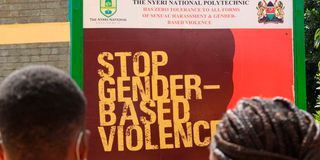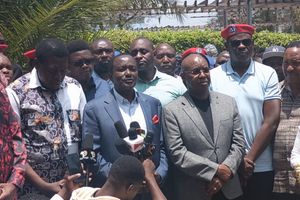Include GBV survivors in intervention strategies

A sensitisation campaign against GBV in Nyeri town on June 28, 2021. Experts are calling for engagement with survivors to break barriers and enhance individual agency, choice and voice towards restoring their dignity and access to justice.
What you need to know:
- Survivor participation is a crucial component of survivor-centred and trauma-informed interventions.
- Co-creation and collaboration is about survivors working with service providers, policymakers, researchers and other stakeholders to come up with jointly designed and implemented policies and interventions.
“Nothing about us without us”, is a dictum popularised by people living with disabilities to underline that their voices must be included in any discussions and decisions concerning them. This principle has also been mainstreamed in initiatives addressing HIV and Aids as was demonstrated during the Maisha conference convened by the National Syndemic Disease Control Council in September.
This same call is applicable to any other group, and certainly to survivors of gender-based violence (GBV), according to Wangu Kanja, the founder of a foundation by the same name.
“Survivor participation is a crucial component of survivor-centred and trauma-informed interventions”, she avers. This requires that survivors are “recognised as experts in their own lives and are actively involved in shaping and guiding the interventions and support services provided to them”.
In this regard, Kanja calls on governmental, civil society and United Nations agencies, development partners, constitutional commissions and media agencies to “facilitate meaningful engagement with survivors to break barriers and enhance individual agency, choice and voice towards restoring their dignity and access to justice”.
In an interview with the Daily Nation, Kanja outlined the following components of survivor participation: empowerment, co-creation and collaboration, meaningful engagement, capacity building, ethical considerations and continuous learning and improvement.
Empowerment and agency are centred on recognition that survivors have their inherent strengths and resilience, must be involved in the healing process and should have control over decisions that affect their lives. In other words, survivors are not mere recipients of predetermined processes. These two concepts emphasise that participation of survivors enhances ownership, devolves responsibility and enables the affected people to provide direction to initiatives about them.
Co-creation and collaboration is about survivors working together with service providers, policymakers, researchers and other stakeholders to come up with jointly designed and implemented policies and interventions. This way, there is synergy, which makes interventions relevant, acceptable, more implementable and effective.
Co-creation, which originated from the business sector, refers to a process where producers involve their customers, experts, employees and suppliers to develop products that are relevant to and appealing to the final consumer. The thesis guiding this is that if policies, products and services build in consumers’ perspectives, uptake is likely to improve.
Meaningful engagement focuses on the fact that survivors should not be included as tokens merely for compliance, but for substantive purposes. Tokenism is a bureaucratic resistance strategy that governments love to temporarily calm down agitation for inclusion. Most times, tokens are figureheads without the knowledge and technical capacity to perform in the positions they are appointed to.
Such engagement means that survivors contribute their ideas and are included in the whole project cycle. This implies that they must mobilise, organise and facilitate their individual and collective participation. They must be given space to discuss, consolidate and present their concerns in a cogent form. They must also be involved in critiquing and validating strategies and policies addressing their concerns.
Experience shows that the presence and voices of survivors add immense value because they are able to articulate the reality in a raw form devoid of jargon and academics, demonstrate urgency and provide insights on what exactly needs to be done in the short, medium and long term.
Training and capacity building is anchored on adding value to the survivors’ knowledge, attitudes and practices. This could cover trauma-informed care, leadership development, advocacy skills, self-care, sources of services, reporting procedures, referral pathways, violence as a human rights violation and networks of fellow survivors for social support and solidarity.
Survivors of sexual violence need to know, for instance, how they can reduce the potential of infection with HIV, preserve evidence, seek medical attention and report the cases to the right authorities.
Ethical considerations are a critical pillar to survivor involvement. This is particularly so in ensuring they are handled with dignity, respect, non-discrimination and empathy.
Today, researchers on GBV are required to seek ethical clearance to check that adequate measures have been put in place to comply with the requirements. Sample guidelines on this are contained in the 2005 publication Researching violence against women: A practical guide for researchers and activists by World Health Organisation and Programme for Appropriate Technology in Health.
Continuous learning and improvement concern treating survivors as an intellectual resource central to generation and consumption of knowledge about GBV. Learning is now an imperative pillar of monitoring and evaluation.
All these points tessellate around participation as a fundamental human right. In the words of the United Nations Secretary General, Antonio Guterres, in September 2020, participation “deepens our understanding of issues, helps identify better solutions (and) leads to a greater sense of ownership, allowing effective implementation”. This ensures that policies and interventions are responsive to survivors’ unique needs, preferences and experiences.
The writer is an international gender and development consultant and scholar ([email protected]).





